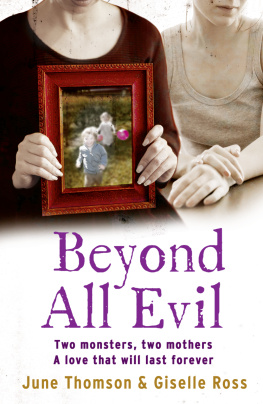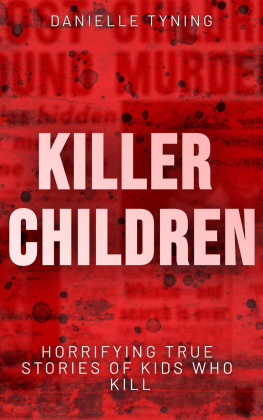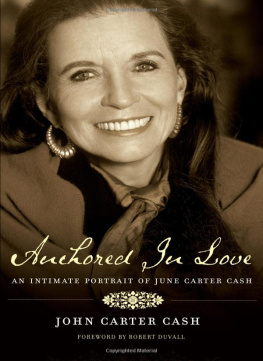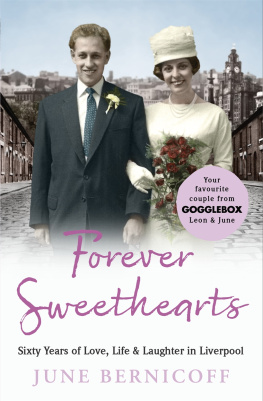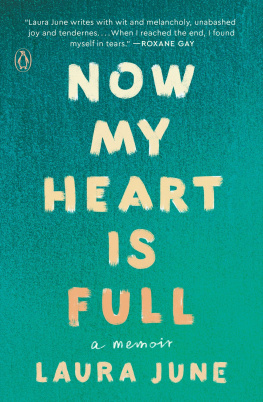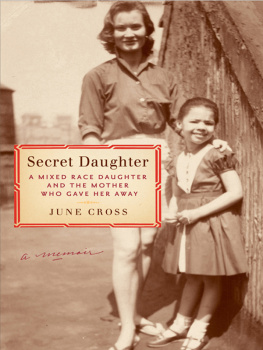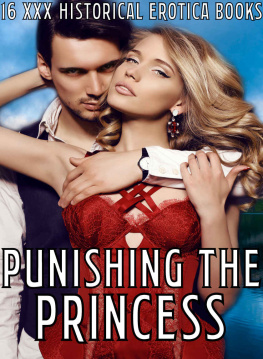BEYOND
ALL EVIL
June Thomson & Giselle Ross
with Marion Scott and Jim McBeth

To little Jay-Jay, Paul, Ryan and Michelle
forever innocent, forever loved
Contents
What follows is a conversation between two mothers who are leading each other from the darkness to the light.
Before they were united by two unspeakable acts of evil, June Thomson and Giselle Ross did not know each other. Today they are the closest of friends. In their hearts they wish they had not been brought together by incomparable loss, but now that they have found each other they are able to walk together towards a future neither of them believed was possible.
Only Giselle can appreciate how June has suffered; only June can understand the monumental effort it takes for her friend to rise and face each new day. This bond has already saved their lives, dragging them back from the edge of madness and giving them the courage to endure unimaginable pain.
On the same day, a few miles apart, June and Giselles estranged husbands, Rab Thomson and Ashok Kalyanjee, murdered their children. The men were not driven by rage. The killings were planned and carried out with precision, and designed to crush the women they had once dominated.
The names of the lost innocents are Ryan and Michelle Thomson, and Paul and Jay Ross, whom you will come to know and love as little Jay-Jay. Ryan was seven. His sister, Michelle, was 25, a wonderfully innocent woman-child, who had an intellectual age equivalent to that of her brother. Paul was six and lived for Spiderman. Jay-Jay was two, he loved Bob the Builder, and was still wrestling with the mysterious joys of a world in which he would not grow up.
Their fathers were the worst of all predators, perfect examples of what has become known as the family annihilator parents who kill their own children in an unfathomable act of revenge.
It is a psychological syndrome that is becoming disturbingly prevalent, but which no mothers intuition or fathers sixth sense can predict.
According to the eminent clinical and forensic psychologist Ian Stephen, such killers are now responsible for more than one-third of all child murders. Throughout the pages of this book and after the mothers story has been told Stephen will offer his professional insight into the minds of the murderers and the women who once loved them.
It may seem a bitter irony that, while their crimes have united their wives, Thomson and Kalyanjee have also been brought together. They languish in the same jail, where they have yet to offer any explanation or display remorse. Their silence continues to devastate both June and Giselle, for no power on earth can erase the misguided guilt they have assumed the belief that somehow they should have known .
The mothers have lived with that erroneous belief since their children were killed. At least they are now insulated by sisterhood and the memories of the happy times with their children.
They have been empowered, each giving the other the strength to tell their unique story the first true account of family annihilators by women who lived with them and survived.
It is a warning and a cautionary tale, but above all it is a story of love and a testament to the human spirit.
Both women endured dreadfully unhappy marriages. Junes life with Thomson was a dark, turbulent and miserable existence, characterised by mental torture, physical violence and even rape. Giselles relationship with Kalyanjee had been a strange and remote affair, of lives spent apart before, during and after their marriage.
In spite of this, their relationships produced treasured children. But on one terrible Saturday in May, the last normal day of their lives, the misery of their marriages swiftly receded into the past.
Both women were on the threshold of a new future. They no longer wanted or needed the men who had ruled their lives but they believed it was important for their children to maintain a relationship with their fathers.
If only they hadnt. The consequences of their trust were unutterably appalling.
This is the story of the parallel journeys that took them to that terrible day when they and their children became the prey of two monsters in our midst.
Marion Scott and Jim McBeth
Prologue: Fairy Shoes and
Toy Soldiers
June: Shoes for Michelle. I had to have them.
Fairy shoes. They glistened with a life of their own, as if they could dance from the shelf. The shop lights, bright and harsh, caused their red, glittering surface to shimmer. Shoes for a princess. Shoes for my Michelle. I could picture my daughter, laughing with delight, her dark-blonde curls streaming behind her as she flew to the wardrobe to pick a party dress to match these beautiful Wizard of Oz shoes.
Christmas music flowed from hidden speakers. Garlands and decorations hung from every wall. I was in a crowded place but, until a few moments ago, I had never felt so alone. Excited voices overwhelmed me, the sounds of mothers, fathers, grandparents and children making plans for the big day. So much excitement to contain, so much to look forward to. I could almost smell cinnamon and spiced apple, the memories of Christmases past.
The room was alive but I had felt dead for so long now. Yet somehow these shoes had brought me to life. I had to have them. They were in my hand. In my bag. Michelle would be so pleased. So pleased.
The part of my brain that knew my Michelle was gone had shut down. A voice spoke to me from very far away. A womans voice.
Who are the shoes for, June?
The use of my name suggests familiarity, but I dont think I know her. Its become a common occurrence. Since it happened, everyone knows me.
Michelle, I answer, still under the spell of the shoes.
Youve put them in your bag, love.
I know. I have to have them, I said, walking to the door of the shop. I could hear Michelles laugh, see her face and imagine her pulling on the shoes. Running to the mirror. My beautiful, damaged daughter with the body of a woman and the mind of a child.
Outside the shop. Assailed by the winter cold. Then a new voice, harsh, authoritative.
Madam! I have reason to believe you have goods you have not paid for. Would you open your bag?
I do what he asks. He fingers the shoes.
You cant have them! Theyre for Michelle! I tell him.
Youll have to come with me!
I follow. Everyone is looking, shocked expressions, judging faces. They dont understand. Tears prick my eyes. The spell of the shoes is broken. I can see the mans face clearly now.
Im sorry, I say. I deserve to be punished. I took the shoes. I had to have them. Can I pay for them, now?
His face tells me what I already know.
I have money, I add, showing him my purse containing 160.
In my mind, I try to tell him I couldnt go to the cash desk. They would have recognised me. They know my daughter is dead. They would have told me Michelle was gone. I was suddenly cold. I wanted to go home.
A policeman and policewoman had arrived. I recognised the woman from the days following the murder of my son and daughter. She spoke quietly to her colleague, who then had a hushed conversation with the store detective.
Come with us, June, said the policeman.
His voice was not unkind. The fairy shoes were gone. They had taken them from me.
It was cold on the car journey to the police station. We passed beneath blurred neon signs that gave only the appearance of warmth. The police station was as brightly lit as the store had been but it was stark, devoid of decoration. I stood before the imposing figure of the desk officer.
How did I get here? How did I get to this?
Next page
